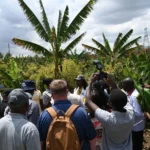
By Kemunto Ogutu | kemuntoogutu@gmail.com
As science journalists continue to report on biodiversity in Kenya’s hotspots, editors and researchers believe that the link between tourism culture and biodiversity is an intricate one that journalists should fully explore.
In a study published in the ‘International Journal of Geoheritage and Parks’, researchers noted that “Ecotourism has been gaining momentum in biodiversity hotspots pertaining to its potential to boost both rural livelihoods and environmental conservation. It has the ability to alleviate poverty, which is profoundly embedded in several areas of society.”
Addressing journalists during a biodiversity reporting training by MESHA Science on Nov 23, 2023, facilitators emphasized the need for journalists to focus on holistic reporting on biodiversity as this would produce more impactful stories.
The editors, who led the discussions on biodiversity reporting, guided the journalists in the training on how to report on the subject.
Nduta Waweru, an editor for Sayansi Magazine, discouraged journalists from overlooking positive stories and focusing on negative ones. “Often we disproportionately cover negative aspects of biodiversity loss, neglecting positive stories of successful conservation efforts, community-led initiatives, or species recoveries. This can contribute to a sense of hopelessness and despair,” she said.
Waweru also noted that many journalists erroneously focus on the ‘biodiversity big shots’, often neglecting the less iconic species that play equally important roles in ecosystems.
Kenya boasts of several unique biodiversity hotspots such as the Lamu archipelago, Kisite Marine Park, Arabuko-Sokoke forest and Kakamega’s equatorial forest. All these hotspots, Waweru said, offer great tourism attractions and draw the attention of many researchers and conservationists.
However, many biodiversity reporters overreport on these famous hotspots that have long been in the conservation headlines. Waweru advised them to consider telling biodiversity stories in cities, which she said, are important ecosystems that should never be overlooked.
In reporting science stories, journalists should tailor their reports to resonate with their local audiences. By informing them on the impacts of biodiversity and its influence on livelihood, culture, and well-being, communities will take greater interest in such stories.
They should also avoid overlooking the gender lens in covering biodiversity stories as such angles often create the required balance in reporting and may breathe uniqueness into one’s stories.
Waweru emphasized the connection between tourism, biodiversity and livelihood, saying, “Tourism activities can support research and monitoring efforts for conservation. Revenues generated from tourism can also be channeled into biodiversity conservation projects,” she explained. “The revenue from biodiversity hotspots also supports local businesses, communities, and conservation initiatives.”









